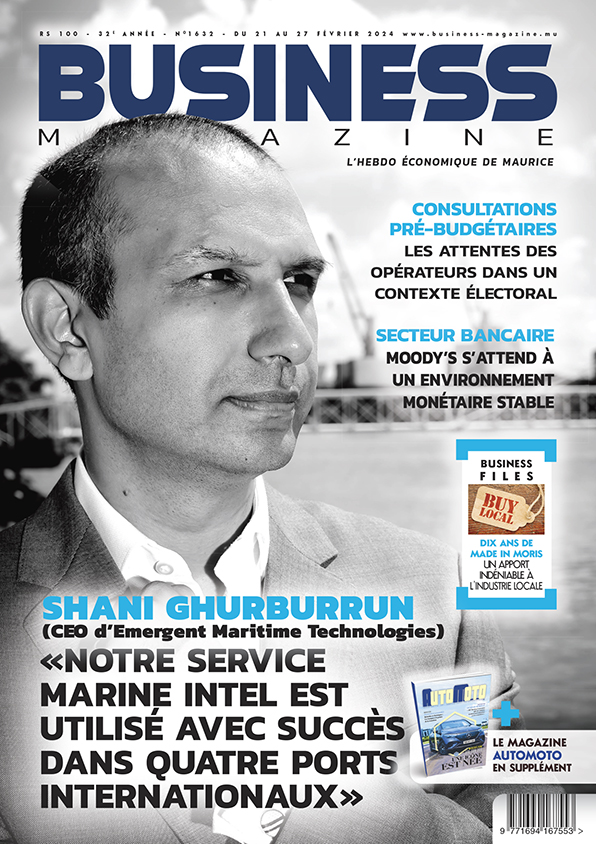Digital economy : Riding the wave of Innovation and Shaping the future of Organisational & Business Excellence
Share

IN the dynamic business context of the fastdeveloping African landscape, Technology and Innovation emerge more than ever the major catalyst for transforming and driving organisations towards Operational and Customer Excellence. All businesses are investing time and resources to re-design their completive edge in order to improve their market share and their business performance.
Investment in the right methodology and transformation projects has become a pivotal element in any organisation’s strategic development roadmap in Mauritius and other African regions. Through our consultancy practice, we can observe a high level of enthusiasm and leadership drive into expediting transformational projects across organisations in all sectors.
Encouragingly, the adoption of new technologies focused on process automation, AI and enhanced data governance for more effective strategic business decision-making are high on the agenda of all forward-looking boards in Mauritius. We have also noted that this trend is also true for a number of countries in Africa where we can witness a spree towards digital transformation projects, increased integration of artificial intelligence and machine learning, e-commerce development, and cybersecurity reinforcement across industries. These initiatives are allowing a more efficient reallocation of existing resources, fostering operational excellence and initiating new revenuegenerating activities.
Major sectors which are embarking and requiring urgent expertise to accelerate their transformation journeys remain Banking & Financial Services, Insurance, Hospitality, Manufacturing, Agriculture and the Services sector. All of these organisations are aiming at enhancing their competitive advantage and acquiring further market share in the respective geographies, hence massive efforts and focus are being channelled towards applying the right methodology to capture their current digital maturity and to map the required technology and systems in relation to their strategic objectives.
It is motivating to witness how the leadership of different companies are becoming more and more welcoming to innovation in the most agile and more open manner. Cocreation, sharing, adopting, and adapting best practices has become the winning formula for agile organisations. Flexibility in simplifying the volatile, complex and ambiguous business landscape is key to approaching transformational projects geared towards operational efficiency and customer-centric innovations.
In the bustling landscape of Mauritius, the ICT sector re-affirms its enablement role in fostering economic growth, innovation, and so cietal development. At from the very outset of 2024, we could observe different digitalisation programs being initiated at different levels of the public sector as well. This is critical, as both government services and the business ecosystem should have a symbiotic transformation journey for the country to reach its digital maturity and create seamless value chains across the economy. In parallel to that endeavour, the benchmarks with regards to digitalisation and innovation should now be levelled up. Most of our peer countries have or are busy embarking on ambitious leapfrogging plans when it comes to accelerating the digitalisation of their respective economy, hence bold decision-making, pragmatism, and proactivity are required for impactful and sustainable projects at national level.
In line with the speed at which organisations are building their business models and services on technology and data, the importance of data protection and cyber governance has become a greater area of focus. Companies are enhancing their business continuity plans by laying more emphasis on Cyber risks management which encompasses Data security, availability, and integrity. Technology companies are investing significantly in developing more effective and efficient tools to mitigate and eliminate those risks. AI is not only playing an important role in helping organisations to automate their processes or creating smarter service delivery models, but it is also integrating the development of Cyberdefence technologies and tools. It is becoming a major component in simulating and managing potential cyberattacks in the most effective and sophisticated way.
In addition to the abovementioned technology, tools and systems, companies are in need of specific Cybersecurity experts who would be responsible to elaborate the appropriate governance frameworks when it comes to managing cybersecurity risk and data protection. Chief Information Security Officers and Security Operations Centres are now commonly offered to the market as a customised service to organisations. This approach addresses the significant resource gap issue in that field of expertise. Likewise, AIpowered cybersecurity tools are enabling organisations to automate a number of cyber defence processes which traditionally required to be driven by individuals. These fast-developing tools and applications are empowering organisations to manage the highly dynamic threat landscape in the most agile and cost-effective manner.
An area where the jurisdiction needs to constantly invest time and focus would be on the required legislative frameworks, which often lag behind the swift pace of technological evolution. Achieving significant alignment within legal and regulatory frameworks is imperative to safeguard stakeholders utilizing diverse technological-enabled platforms. It is comforting to observe that relevant institutions and regulators in Mauritius have significantly increased stakeholder engagements in recent years, aiming to craft the most suitable legal frameworks in the ecosystem’s best interests.
At the heart of this technological revolution, the unwavering commitment of the country leadership as well as that of business leaders to digitalisation and business transformation is of utmost significance. The resource gap issue should be tackled in the most pragmatic and creative manner. Mauritius is facing a dire state of talent shortages in different critical sectors, hindering economic growth and delaying innovation. To address this, businesses must not only leverage on favourable tax measures but also attract more experts in emerging technologies, thereby strengthening their position in the global market. Different initiatives at different levels are being observed but unfortunately it is at times being done in a less concerted and holistic manner due to the complexity and urgency of the matter. More synergised approach is required to elaborate a nationwide strategy with regards to workforce transformation and capacity building. It has to be driven strategically by the government and economic operators in a more structured and resultoriented manner. It is the key for sustainable development and growth for all major sectors of our economy.
We are looking forward to even more creative and innovative decisions and budget measures in the coming months. A special focus should be geared towards “Digital Entrepreneurship” with appropriate support mechanisms and easier access to funding and mentorship programs which can help to foster successful development of start-ups which can result in catalysing economic growth and creation of job in the ICT sector. Collaboration with international partners and organisations should also be encouraged and facilitated so that knowledge exchange, technology transfer, and faster capacity building can take place. By fostering strategic partnerships, Mauritius can harness global expertise and resources to address key challenges and seize emerging opportunities.
As Mauritius rides the continuous waves of transformation in its economic landscape and where opportunities for innovation intertwine with the constraint of talent shortages, a bold and structured approach to addressing these challenges is a must. The country should fully harness the potential of emerging technologies for its sustainable growth and development. By prioritizing digital inclusion, investing in skills development, enhancing cybersecurity measures, and fostering regulatory frameworks conducive to innovation, Mauritius can position itself as a regional leader. With concerted efforts from all stakeholders in developing a strategic and structured approach to the country’s transformation plan, the future of our digital economic model is certainly attainable.













